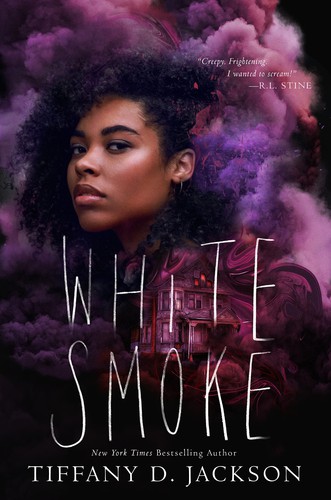Review of 'White Smoke' on 'Goodreads'
3 estrellas
This was a good book overall and an enjoyable read, certainly one I'd recommend. Higher than 3, but not quite 4 star for reasons I will go in to.
I particularly liked the depth of storytelling, which frankly caught me by surprise. I went in expecting a somewhat run-of-the-mill, family-moves-into-haunted-house scenario but interwoven were some very interesting social themes which make the book feel very grounded in reality, particularly when looking from the perspective of minority communities:
- Racism;
- Gentrification;
- Addiction, anxiety, paranoia and the mental health struggles surrounding such.
- Blended family challenges, touching upon some struggles of both parents and the children involved;
- Use of religion and televangelism as a tool to influence the masses and prey upon peoples' poverty through religion while making those 'preachers' rich in the process;
- Major businesses/money backers and the influence they have over communities;
- The heavy-handedness of …
This was a good book overall and an enjoyable read, certainly one I'd recommend. Higher than 3, but not quite 4 star for reasons I will go in to.
I particularly liked the depth of storytelling, which frankly caught me by surprise. I went in expecting a somewhat run-of-the-mill, family-moves-into-haunted-house scenario but interwoven were some very interesting social themes which make the book feel very grounded in reality, particularly when looking from the perspective of minority communities:
- Racism;
- Gentrification;
- Addiction, anxiety, paranoia and the mental health struggles surrounding such.
- Blended family challenges, touching upon some struggles of both parents and the children involved;
- Use of religion and televangelism as a tool to influence the masses and prey upon peoples' poverty through religion while making those 'preachers' rich in the process;
- Major businesses/money backers and the influence they have over communities;
- The heavy-handedness of the American justice and penal systems when it comes to minor drug offenses, specifically when it comes to minorities and minority communities;
- The issues with policing in minority communities;
- The very real reference to "Devil's Night," which was an actual thing where arson plagued Detroit for decades, primarily in the low-income minority areas.
Warning: Spoilers beyond this point.
Marigold was a very polarizing main character throughout this story, and that was actually a good thing. It made her feel like a real and very believable main character struggling with some major problems in her life. Given her age, this compounded these struggles somewhat. You really do get the impression of a young girl trying to do the right thing and go down the right path, but struggling to do so due to her issues. Her tale is pretty tragic really, ultimately feeling as though her history makes her a very unreliable witness to certain events to the point of her testimony being discarded at best and blamed on a relapse at worst. As the reader, knowing this wasn't the case was certainly frustrating but I think that's the entire point that Jackson, as the author, was trying to get across: it is exceptionally hard for recovering addicts, as well as those struggling with anxieties and phobias who may sometimes appear irrational in the case of panic/anxiety attacks, to appear as credible even when they're telling the truth sometimes. Feeling that frustration is a glimpse into the existence of anyone who has been through that, and I can't imagine how frustrating that must feel for real, particularly when your own mom would rather give you a drug test than believe there's a shred of truth to what you're saying. Ouch.
I think the parents in this scenario are the most unfortunate aspect of the story. While Marigold could be criticized to a degree for falling back on marijuana as a means of coping and dealing with her problems, this is what makes her character so believable to me. This is what actual people do. I think most of us have engaged in unhealthy ways of coping with our problems, and Marigold resonates with me as a person because of that. This is particularly true due to her age, I feel. It's the parents in this case who should have recognized that she's going to need more than just a "fresh start" where they run the risk of a repeat of the past, just in a different location. They should have been the ones who set up healthy ways of her addressing her problems, including therapy and psychiatry if necessary. They seem so blind to their daughter's enhanced needs, and that certainly is a source of genuine frustration for me as a reader, particularly as the incident that caused them to move in the first place was by no means a triviality but ultimately goes unaddressed by those who should care the most. Instead, they just seem to think a change of venue will make all of her problems magically go away. If only that's how it worked.
In fact, the journey of Marigold's character development I'd argue was one of the best aspects of this book for me, as a reader. I didn't go in expecting this from a horror book, but that's the feeling I ultimately left with. Watching her take on board Yusef's advice and attempting to emphasize with her step-sister, as well as seeing her gradually stop viewing her own behavior in a vacuum and beginning to understand how and why certain choices she makes could be problematic and even traumatic to others and affect them negatively was a satisfying journey to take with her as the reader.
So with all those good parts, why only a 3 star rating? I felt the book let me down primarily in its initial hook: the horror aspects. More so the reveal in what was causing the "supernatural" phenomena to occur, as the suspense and atmosphere that comes with good horror was certainly present. It was a little unbelievable to me that Ms. Suga and Jon-Jon were still alive and living with the family the whole time, and even moving around the house so frequently (including Jon-Jon's sleep walking) without being seen by anyone other than Marigold, at least for most of the book. There's just so many questions and plot holes you'd have to overlook to allow this to occur, including what they were doing before Mari and her family moved in. You also have to suspend disbelief quite heavily to allow the plot of this whole thing being orchestrated and part of a larger plot to reignite tensions, ultimately leading to the destruction of the place purely for redevelopment, to make sense. There are many factors which could have gone wrong with this plan and ultimately would have if this was a real scenario, I feel. It was all a little too perfect for me to explain how everything came together, and quite the stretch at that.
The other aspect of this book which felt like a let-down was the ending, as many others have touched upon. The ending came out of nowhere for me, to the point where I went back and read the final page again just to be sure I didn't miss something. It literally ended without really delving into any of the aftermath of what happened and how things played out. A lot of questions went unanswered and there was a lot of room to resolve many burning questions you'd have by the end of the book. A couple of extra chapters to sate that curiosity would have been enough, if not an epilogue to wrap things up. This certainly dropped the rating for me. I think with a more round ending I'd have given this 4 stars even with the barely believable resolution of the main horror plot.
This was my first read by Tiffany Jackson and it certainly won't be my last. I really enjoyed the writing style throughout and the way she chose to interweave pertinent and challenging topics into the story in a natural way while making her story's characters both believable and, in some ways, relatable in their imperfectness.

